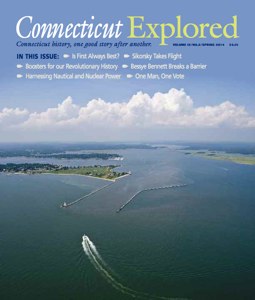By Elizabeth J. Normen
(c) Connecticut Explored Inc. Spring 2014
Subscribe/Buy the Issue!
Here’s why I’m wary of claims of being “first” in history.
 Last fall I was researching online other publications comparable to Connecticut Explored and came across New York Archives, a magazine published by the New York State Archives Partnership Trust. Their Spring 2013 issue included a story that asserted that Myrtilla Miner of Madison County, New York, “opened the first school in the country dedicated to the training of black female teachers” in 1851. Had Prudence Crandall, Connecticut state heroine, been “dissed?” Crandall opened her school for “little misses of color” nearly 20 years earlier; some of her students went on to become teachers—one of the few occupations open to an educated woman of any color in that era. I immediately shot an e-mail over to Karin Peterson at the State Historic Preservation Office, who oversees the Prudence Crandall Museum—one of our four state museums. She in turn sent off a letter to the New York Archives’s editor to point out that Crandall—and no doubt others—preceded Miner.
Last fall I was researching online other publications comparable to Connecticut Explored and came across New York Archives, a magazine published by the New York State Archives Partnership Trust. Their Spring 2013 issue included a story that asserted that Myrtilla Miner of Madison County, New York, “opened the first school in the country dedicated to the training of black female teachers” in 1851. Had Prudence Crandall, Connecticut state heroine, been “dissed?” Crandall opened her school for “little misses of color” nearly 20 years earlier; some of her students went on to become teachers—one of the few occupations open to an educated woman of any color in that era. I immediately shot an e-mail over to Karin Peterson at the State Historic Preservation Office, who oversees the Prudence Crandall Museum—one of our four state museums. She in turn sent off a letter to the New York Archives’s editor to point out that Crandall—and no doubt others—preceded Miner.
Inc. magazine columnist Eric Paley, in the June 2013 issue, asserts that being first in business is rarely something to crow about. “Pick a successful company, and you can almost always point to the sad story of a failed predecessor that had the same core idea.” Some of our most successful new companies—Google, Amazon, Facebook—didn’t create the idea, they just perfected it. Might that have been enough of a claim for Miner? Her school went on to become part of the New York state university system. We know what happened to Crandall’s school—local opposition forced her to close it not long after it opened. The state legislature moved quickly and enacted a law banning schools “for the instruction of colored persons belonging to other states and countries” that same year (1833, repealed in 1838).
In 2013, Connecticut tried to assert itself as the site of the first manned and powered flight by passing Bill 6671 in the state legislature. The bill announced that “Powered Flight Day is in honor of the first powered flight by Gustave Whitehead, rather than the Wright Brothers,” an event that the bill claims occurred near Bridgeport in 1901. Such efforts to unseat the Wright Brothers (and there are others with claims) have been going on for decades—this latest apparently fueled by a newly discovered and very fuzzy photograph purporting to be proof that Whitehead flew in 1901. A Bridgeport Herald article dated August 18, 1901 serves as additional evidence. Unfortunately, it’s not very solid proof. (Read Daniel Schenloff’s article dated June 13, 2013 on scientificamerican.com for a full analysis.)
My question is, is the designation as “first” really useful? The fact is that many innovations—in everything from education to airplanes, automobiles, bicycles, and many other inventions—have been developed by many people at the same time. Being first can be a case of splitting hairs, and hard evidence can be hard to come by. Passing legislation doesn’t change that, and I fear that doing so makes Connecticut look foolish. Schenloff’s Scientific American article drips with disdain about our state’s claim. Why press that point when Connecticut has no shortage of incredible and completely legitimate aviation history to take pride in?
Even so, we love the state’s “Still Revolutionary” tourism campaign slogan and have made it, and “firsts,”—very loosely—the theme of the Spring 2014 issue. Read about Igor Sikorsky’s innovation in helicopters on page 20. True to our independent spirit, a couple of our stories may turn out to not be so revolutionary after all. In fact, we’d love to find evidence that Bessye Bennett (see page 32) was the not first African American woman to practice law in Connecticut—because the 1970s (that is not a typo) is embarrassingly late, given that black women had been practicing law in other states for 100 years. Still, we’re proud of Bennett, as she most certainly is an exception to Paley’s theory about the failure of “firsts.” Read on and decide for yourself about the validity of “firsts,” and reflect on the state slogan. Personally, I like it for its aspirational message for a future that builds on our fascinatingly complex past.
P.S. New York Archives published Peterson’s letter to the editor defending our state heroine in its Winter 2013/14 issue.
